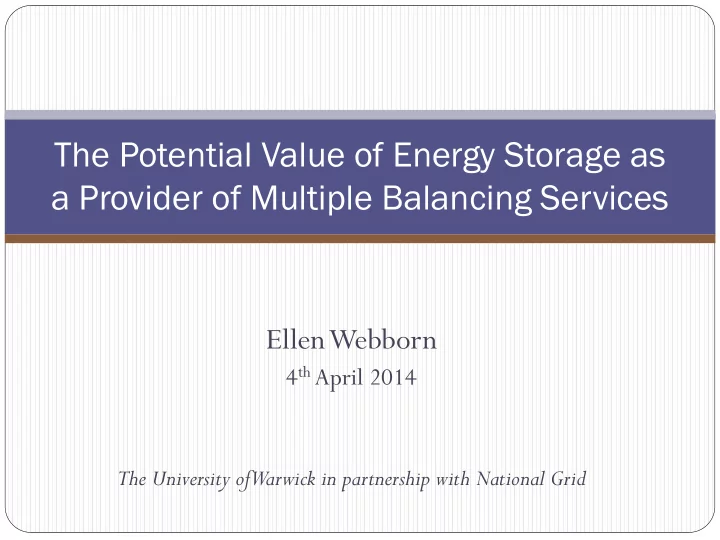

The Potential Value of Energy Storage as a Provider of Multiple Balancing Services Ellen Webborn 4 th April 2014 The University of Warwick in partnership with National Grid
Questions to Address What services could energy storage provide to the system operator? Could provision of multiple services be possible? If so, which? What would be the expected revenue from providing such services/combinations of services? What issues need to be considered, for instance reliability?
Frequency Response National Grid is obliged to maintain system frequency at close to 50Hz Employs generators to increase or decrease power output to control system frequency Cost to National Grid is approximately £170m per year
Reactive Power Services Important for voltage management Generators paid to absorb/generate reactive power to control local voltage levels Cost to National Grid is approximately £68m per year (expected to increase)
Network Development and Constraint Management Creation of new power generation or areas of demand can increase congestion on power lines National Grid invests to reinforce the network to prevent congestion issues An optimally-located energy store could delay or even eliminate some of these investment costs
System Challenges Cause Effect Impacted Services Lower System Inertia Frequency Response Embedded Less predictable power Generation supply (Renewable Power) Supply further from consumption Reactive Power Services Interconnectors Lines less loaded to continental Europe (particularly at night) Electrification of Greater electricity Infrastructure Transport demand Reinforcement
Project Outline • Gather data at National Grid relating to balancing service usage in 2013 Data • Assess feasibility of contracting multiple services simultaneously Feasibility • Estimate the potential value of multiple service provision by energy storage Value • Study how different types of storage act under different scenarios Simulate
Ramping Reactive Constraint Efficiency Power Mgt. rates Running Frequency Spot Capacity Incidents Prices costs Store Data Model Simulation (Evolutionary Algorithm) Optimal Operation Expected Optimal Combination of Strategy (when to Revenue/Savings to Services Contracts charge and discharge) National Grid
Summary The potential value of future energy storage technologies is hard to estimate Multiple services could be provided, but the feasibility and profitability of combining service provision is still unclear A study based on real data about the current provision of balancing services should help with estimating the potential role energy storage could play in a future energy market If energy storage could be shown to offer a financially viable alternative to current methods, this could have an impact on policy making and investment in energy storage technology research
Thank You e.webborn@warwick.ac.uk www.warwick.ac.uk/ewebborn
Recommend
More recommend